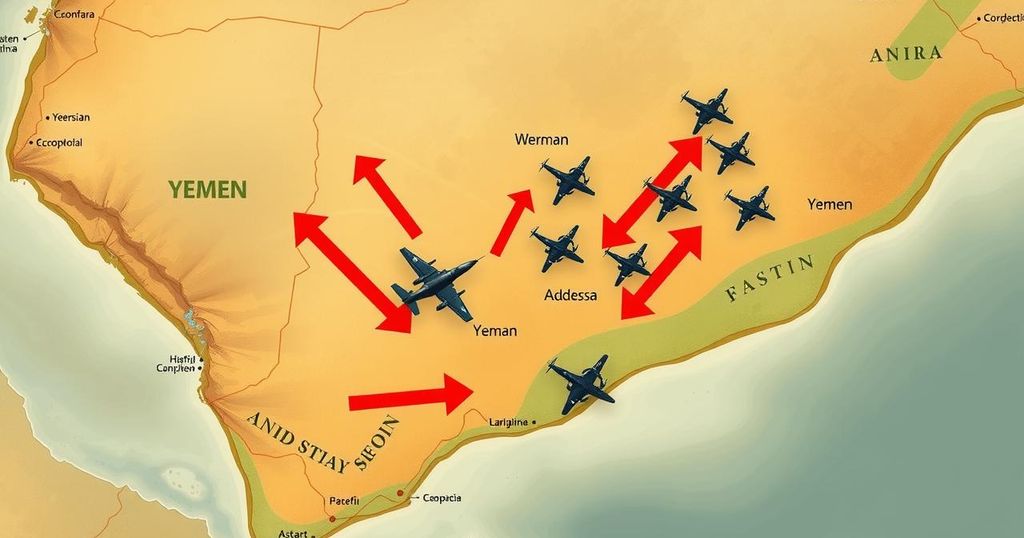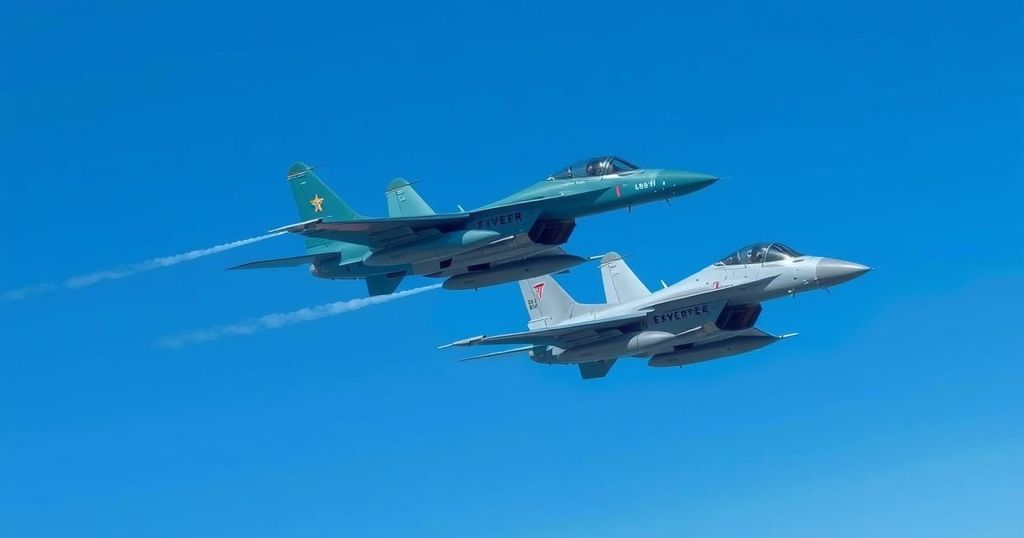Conflicts
Elections
Politics
ASIA, ATLANTIC, BARACK OBAMA, DEMOCRATS, DONALD TRUMP, GEORGE W BUSH, MIDDLE EAST, NATIONAL SECURITY, NORTH AMERICA, PETE HEGSETH, POLITICS, SAUDI ARABIA, TERRORISM, TRUMP, TRUMP ADMINISTRATION, UN, UNITED ARAB EMIRATES, UNITED STATES, US, WASHINGTON, YEMEN
Omar El-Sharif
Examining US Military Interventions in Yemen: A Cycle of Failed Policies
The article discusses the outrage surrounding the Trump administration’s disclosure of classified military plans in Yemen. It argues that the real concern is the two decades of failed US policies in Yemen, which have led to significant humanitarian crises. The piece underscores the need for accountability and questions the effectiveness of ongoing military operations, calling for diplomatic approaches instead.
The recent disclosure revealing that senior members of Donald Trump’s administration shared classified US military strategies concerning Yemen in a private group chat has provoked significant outrage in Washington. There are calls for investigations and resignations, particularly targeting Defense Secretary Pete Hegseth and National Security Adviser Mike Waltz. Yet, amidst this uproar, a crucial question remains overlooked: why is the United States engaged in military actions in Yemen at all?
Historically, five US presidents have enacted military measures in Yemen over the past two decades, perpetuating a cycle of bombings and counter-terrorism operations that have failed to resolve the conflict. Each administration, from George W. Bush to the current Trump administration, has continued policies that have led to humanitarian disaster in Yemen, a nation already stricken by poverty. Trump’s stance, often clothed in promises of peace, appears paradoxically aligned with a continuation of these past failures, particularly during Yemen’s protracted civil war.
The humanitarian consequences of these conflicts are dire. The UN estimated that by the end of 2021, 377,000 individuals had perished from the Yemen conflict, with a large percentage of those deaths attributable to indirect factors like malnutrition and collapsed healthcare systems rather than direct combat. Despite these issues, the Houthi forces have remained resilient, strengthening their position after each engagement.
Critics have yet to address the fundamental question regarding the effectiveness of two decades of American military intervention. The ongoing cycle of aggression has yielded little to no positive outcomes, raising the need for real accountability in US foreign policy, which should take precedence over the current scandal surrounding the leaked military correspondence.
The Trump administration has justified the latest military strikes in Yemen as measures to dissuade the Houthi militia from assaulting shipping routes in the Red Sea. This escalation followed increased Houthi activity amid the wider conflicts stemming from the Hamas attacks on Israel and subsequent Israeli operations in Gaza. Despite these justifications, the Houthis have countered that their actions are in defense of Palestinian interests and have committed to ceasing hostilities against shipping once Israel halts its advances in Gaza.
In January 2024, the Biden administration, in cooperation with Britain, initiated missile strikes on numerous targets in Yemen but faced ineffective results, as Houthis increased their attacks. Reacting to the US military actions, the Houthis capitalized on their symbolic resistance against Israel, enhancing their standing across the Arab world despite the heavy toll of the ongoing conflict.
The Biden administration opted not to exert pressure on Israel to pursue peace discussions and maintain a ceasefire with Hamas, thereby failing to resolve the turmoil affecting regional stability. Instead, it maintained the course of military engagement, which was unable to safeguard shipping interests in the Red Sea. The Houthis, emboldened by these developments, employed their narrative of defending the Palestinian cause to garner support internally and regionally.
A ceasefire was brokered between Netanyahu and the Biden administration on January 19, which resulted in a temporary halt to Houthi attacks. However, as the ceasefire’s terms faltered, tensions resurfaced when Israel resumed its offensive, resulting in grave casualties. Consequently, Houthi leaders reiterated their threats to target shipping lanes, prompting the Trump administration’s renewed threats of military action against Yemen.
Trump’s approach closely mirrors that of previous administrations, reiterating the same strategies without yielding different results. The messages from Trump’s cabinet discussed military actions against the Houthis without considering diplomatic avenues that could lead to de-escalation. The persistence of bombing Yemen, driven by the hope of a different outcome, reflects a disconnection from the potential for a peaceful resolution that addresses the underlying causes of the conflict.
The article underscores the cyclical nature of US military interventions in Yemen, highlighting a pattern of failed policies spanning multiple administrations. While the recent revelations around the Trump administration’s communications sparked outrage, the more pressing question revolves around the efficacy of these military actions and their humanitarian cost. Recognizing the need for accountability in US foreign policy and considering diplomatic solutions appears crucial to breaking this cycle of violence.
Original Source: www.theguardian.com








Post Comment